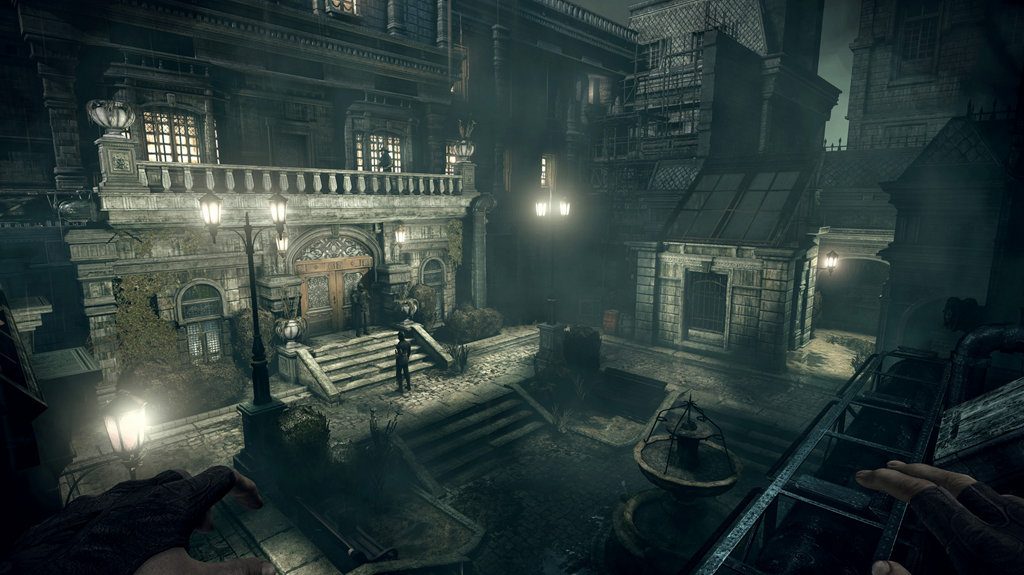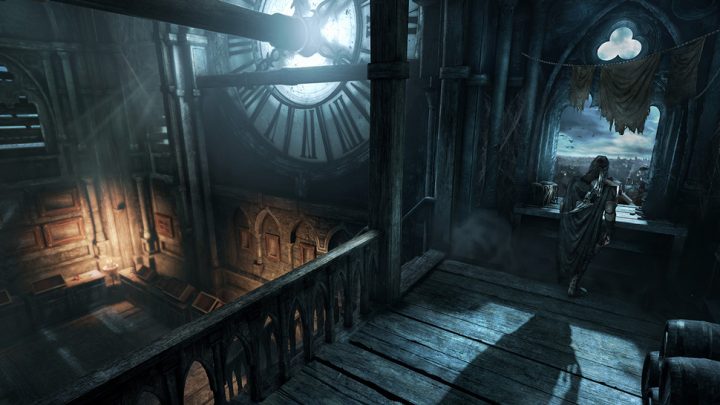As obvious as it sounds to say so, in Thief you nick things. You nick a lot of things. Broaches, necklaces, wallets, candelabras – anything valuable that’s lying around, really – all disappear into lead character Garrett’s bottomless sack.
You find some of these trinkets in the oddest of places. One would expect to find a golden bracelet or two in a wall safe behind a painting, but who on earth leaves a goblet on a rooftop or a couple of coins at the edge of a pond?
It’s possible Eidos Montreal has left these treasures scattered around its game in order to put players into the headspace of its protagonist. If that’s the case, it’s an absolutely brilliant piece of game design because stealing stuff in Thief isn’t just fun, it’s addictive. After you’ve snagged your first five or six baubles, you turn into a veritable magpie, filled with the need to obtain any shiny object that catches your eye – even if it means potentially exposing Garrett to danger in order to do so.

This compunction to loot is backed up by the game’s open-ended structure and its seductive visuals. Thief is set in a gloomy urban sprawl where the architectural schools of Gothic Europe, Victorian London and Steampunk Sci-Fi seem to have collided in a mass of fog and iron. Garrett, the antihero of the series since its 1998 premier, it back, returning to his home town, which is now in the grip of both a horrendous plague and a tyrannical ruler, The Baron. A palpable sense of foreboding drapes over the city’s gas-lit streets and shadowy rooftops, an effect that’s bolstered in no small part by the flashes of lightning that briefly throw Garrett’s shadow onto the walls and pavements around him.
As sinister as all of this sounds, it becomes apparent early on that the city’s darkened alleys and rooftops are Garrett’s natural turf. His almost superhuman ability to move noiselessly through his surroundings turns the skyline into his thoroughfare and makes every shadow inviting. Garrett also has the ability to ‘swoop’ in and out of pools of light quick enough to avoid detection and he’s armed with a decent array of equipment including lockpicks, arrows and a crowbar to force open the odd window.
Stolen moments
From the evidence of the preview build I had a hands-on with, Thief contains the odd brief linear passage, which helps move the narrative along, but once Garrett is in view of a building that houses a valuable item he’s after – whether it’s part of a side task or a story mission – Thief’s structure opens up. Couple this loose framework with the kleptomaniacal impulses instilled in the player early on, and the world in Thief simply begs to be explored.
A great example of this came in a passage of play that occurred after the game’s tutorial level. Following a bungled robbery, Garrett has to flee back to his headquarters through one of the city’s mercantile districts. As I picked my way across the rooftops, noticing one of the streetlamps below me was on the blink, I heard a couple of guards remarking on how beautiful a golden mask in the window of a jewelry shop looked.

Well, I thought, since it’s on my way…
The jewelry shop raid showed there’s no set way to successfully pull off a burglary. It was possible to enter the premises by observing the nightwatch guards, taking note of their patrol patterns, timing one’s movements to reach the shop’s door undetected and then picking the lock. Alternately, I found after circling the emporium that one of the back windows was open and it was possible to enter by shimmying up to the
rooftops.
Once inside, I found that the open-ended nature of progression extended to the style of play, too. To wit, players can proceed as loudly or as quietly as they wish, although, they’ll find that playing to Garrett’s strengths – moving stealthily and hiding from view – will prove easier in the long run.
In my run-through I found one guard on patrol in the front of the shop, but incapacitating him was easy enough. Once I’d helped myself to everything that wasn’t nailed down on display, I picked the lock of the window display case and found that the mask in the window that had so impressed the guards was actually gilded glass – and thus, worthless. At this stage I could’ve easily made my exit but I decided, since I’d gone to the trouble of breaking and entering, to explore more of the shop.
Waiting game
I’ll neither reveal what else I found, nor will I reveal any details I uncovered about the game’s plot. Believe me when I tell you I’m doing you a favour. The less one knows about the game’s story and its hidden gems, the better time one will have when it’s released at the end of next month. That is, if the developers manage to sort out a couple of issues that, while not deal-breakers, are irritating nontheless.
Garrett’s inventory, for example, is mapped to the touchpad on the PS4’s controller, but the way it’s been implemented renders it virtually useless. Selecting items involved hammering the touch pad and while this is irritating enough during sections of the game where players have a lot of time to consider their next move, it would be potentially infuriating if they’re under duress.

Second, I can report that Thief has a lot of beautiful loading screens, and it’s a good thing that they’re beautiful, because players will be staring at them for an awfully long time. Loading times feel interminable and when they appear after a dramatic cutscene, they manage to break the atmospheric spell the rest of the game is so successful at weaving. Facial animations also look positively last-gen, which is strange because the environments surrounding the characters are fantastically detailed and beautiful to behold.
Here’s hoping Eidos manages to tighten up these flaws because they’re sizable chinks in Thief’s armour. Without them, there’s a lot in this game to admire and the pull of its world is intoxicating. Thief puts players into the headspace of a light-fingered ne’er-do-well and drops them into a city filled with trinkets to steal and houses to break into. Even with its niggles Thief accomplishes what the best adventure games set out to do – it surrounds you in a world you could get lost in and then encourages you to do just that.

